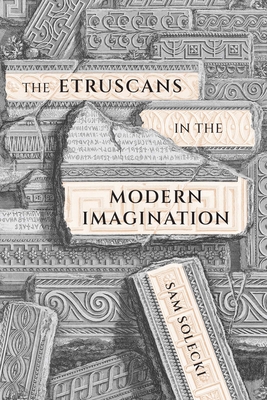The Etruscans in the Modern Imagination

The Etruscans in the Modern Imagination
The Etruscans, a revenant and unusual people, had an Italian empire before the Greeks and Romans did. By the start of the Christian era their wooden temples and writings had vanished, the Romans and the early church had melted their bronze statues, and the people had assimilated. After the last Etruscan augur served the Romans as they fought back the Visigoths in 408 CE, the civilization disappeared but for ruins, tombs, art, and vases. No other lost culture disappeared as completely and then returned to the same extent as the Etruscans. Indeed, no other ancient Mediterranean people was as controversial both in its time and in posterity. Though the Greeks and Romans tarred them as superstitious and decadent, D.H. Lawrence praised their way of life as offering an alternative to modernity. In The Etruscans in the Modern Imagination Sam Solecki chronicles their unexpected return to intellectual and cultural history, beginning with eighteenth-century scholars, collectors, and archaeologists. The resurrection of this vanished kingdom occurred with remarkable vigour in philosophy, literature, music, history, mythology, and the plastic arts. From Wedgwood to Picasso, Proust to Lawrence, Emily Dickinson to Anne Carson, Solecki reads the disembodied traces of Etruscan culture for what they tell us about cultural knowledge and mindsets in different times and places, for the way that ideas about the Etruscans can serve as a reflection or foil to a particular cultural moment, and for the creative alchemy whereby artists turn to the past for the raw materials of contemporary creation. The Etruscans are a cultural curiosity because of their disputed origin, unique language, and distinctive religion and customs, but their destination is no less worthy of our curiosity. The Etruscans in the Modern Imagination provides a fascinating meditation on cultural transmission between ancient and modern civilizations.
PRP: 360.00 Lei
Acesta este Prețul Recomandat de Producător. Prețul de vânzare al produsului este afișat mai jos.
324.00Lei
324.00Lei
360.00 LeiLivrare in 2-4 saptamani
Descrierea produsului
The Etruscans, a revenant and unusual people, had an Italian empire before the Greeks and Romans did. By the start of the Christian era their wooden temples and writings had vanished, the Romans and the early church had melted their bronze statues, and the people had assimilated. After the last Etruscan augur served the Romans as they fought back the Visigoths in 408 CE, the civilization disappeared but for ruins, tombs, art, and vases. No other lost culture disappeared as completely and then returned to the same extent as the Etruscans. Indeed, no other ancient Mediterranean people was as controversial both in its time and in posterity. Though the Greeks and Romans tarred them as superstitious and decadent, D.H. Lawrence praised their way of life as offering an alternative to modernity. In The Etruscans in the Modern Imagination Sam Solecki chronicles their unexpected return to intellectual and cultural history, beginning with eighteenth-century scholars, collectors, and archaeologists. The resurrection of this vanished kingdom occurred with remarkable vigour in philosophy, literature, music, history, mythology, and the plastic arts. From Wedgwood to Picasso, Proust to Lawrence, Emily Dickinson to Anne Carson, Solecki reads the disembodied traces of Etruscan culture for what they tell us about cultural knowledge and mindsets in different times and places, for the way that ideas about the Etruscans can serve as a reflection or foil to a particular cultural moment, and for the creative alchemy whereby artists turn to the past for the raw materials of contemporary creation. The Etruscans are a cultural curiosity because of their disputed origin, unique language, and distinctive religion and customs, but their destination is no less worthy of our curiosity. The Etruscans in the Modern Imagination provides a fascinating meditation on cultural transmission between ancient and modern civilizations.
Detaliile produsului











